 | |
June 23, 2003 | |
|
As the phone lines between front offices begin to heat up with the first trades of the year, let's take a look back at a historical blockbuster still just as shocking today as it was five years ago this week: June 26, 1998: The Vancouver Iron Fist trade SP Curt Schilling, OF Kenny Lofton and C Dan Wilson to Arkansas for OF Ryan Klesko, C Javier Lopez, a 3rd Round pick in 1999, 1st Round and a 3rd Round pick in 2000, and a 4th Round pick in 2001. Strange Bedfellows
This was no surrender trade. The hated archrivals had made the deal even as they battled for the Morris championship -- they would, naturally, finish 1-2 in the division standings, and go on to face each other in the World Series that season. In the midst of their decade-long war, Zajac and Matiash both gambled on a deal that each hoped would mean more wins, both today and in the future. What's a Schilling Worth? "Lopez and Schilling were the keys to the deal," Zajac said, reminiscening about the swap in his spacious office overlooking the Iron Dome. "I remember we made this trade when Stump said he wanted Schilling and I said it would take a lot to get him." Schilling, a two-time All-Star, was 30 years old and one of the league's premier right-handed starters, though not yet the dominant ace he's been over the last two seasons. "Schilling was the main focus for me in the deal. Lofton was secondary," Matiash agreed, speaking during batting practice of a Bridgewater rec league softball game. "I remember Yaro wanted Lopez alot, but not as much as he wanted all those picks in order for Schilling to be included," Matiash said. "Basically, I would have to rip him off to get me to give up Schilling, so he gave me a ton of picks," Zajac agreed.
An All-Star in 1993 and 1996, Schilling was coming off a workhorse season in '97, good but not great (20-7, 4.41 ERA, 1.36 WHIP, 217 K in 236.2 IP), and his '98 first half wasn't much better (7-7, 4.03 ERA, 1.24 WHIP). There wasn't any doubt that Schilling took a back seat to Greg Maddux -- who would win his third straight McDonald Award that season, going 26-4 with a 2.49 ERA, 1.07 WHIP -- but Curt had more competition coming up from behind. Zajac's eye for pitching talent had put together a stable of the best young arms in baseball, with 24-year-old Brad Radke (17-7, 2.82 ERA, 1.09 WHIP), 24-year-old Justin Thompson (13-7, 3.44 ERA, 1.21 WHIP), 22-year-old Matt Morris (8-3, 3.98 ERA, 1.37 WHIP) and 25-year-old Chris Holt (7-4, 4.09 ERA, 1.43 WHIP). With those four can't-miss prospects waiting in the wings -- and with veterans Maddux, Andy Benes (6-2, 2.45 ERA, 1.19 WHIP in 13 starts) and Tim Wakefield (1-1, 3.12 ERA, 1.04 WHIP in 5 starts) to anchor the rotation for the rest of the '98 season -- the 30-year-old Schilling was looking very expendable. Building Blocks But though Vancouver had plenty of depth at starting pitcher, they needed some more bats in a lineup that would finish sixth in offense and had just one regular hitting above .300 (Edgar Martinez, .315). If Schilling could be pried away from the Iron Fist, Arkansas's bait would be draft picks -- and plenty of them -- along with two of the league's premier young batters: Javy Lopez and Ryan Klesko. Lopez had eye-popping numbers as a 24-year-old rookie two years before (.344, .905 OPS, 34 HR, 119 RBI) with the Sacramento Seahawks, and followed it up with a solid sophomore campaign (.273, .747 OPS, 23 HR, 61 RBI). The Golden Falcons got him for what seemed like a bargain price during the 1997-1998 off-season, giving up RP Mike Bielecki, a second-round draft pick and two prospects -- Shawn Green and Jason Kendall. Hindsight is 20/20! (Along with Lopez, the Golden Falcons also picked up veterans Bobby Bonilla and Ray Lankford. Bonilla had a fine year with Arkansas, hitting .294 with a .869 OPS in 480 AB; before Opening Day, Lankford would be dealt, with pitchers Mike Jackson and Jeff Shaw, to the Austin Outlaws for Andres Galarraga and Scott Radinsky.) Klesko, like Lopez, lit up the league as a 24-year-old rookie in 1996 (.378, .464 OBP, .757 SLG, 260 H, 67 2B, 64 HR, 225 RBI) with the Sugar Bears. But two years later, he was hitting just .244 (though with a still impressive .614 SLG) and vowing to test the free agency waters after signing with Scott Boras. Newark sent him to Arkansas for Denny Neagle in what must have seemed like a good idea at the time. (Neagle would go 8-6 with a 4.44 ERA for the Sugar Bears over the rest of the season.) The ever-crafty Matiash obviously made the swap with another one in mind -- the Golden Falcons had no use for Klesko, with Frank Thomas at first base, Jason Giambi at designated hitter and an All-Star outfield of Barry Bonds, Juan Gonzalez and Gary Sheffield -- and, sure enough, Klesko was sent to Vancouver 10 days later, without ever putting on an Arkansas uniform. In addition to the two young studs, Arkansas gave up what was perhaps the most tantalizing part of the deal to the Iron Fist: Four choice draft picks, including a first rounder, spread over the next three years. Lofton and Wilson Included
Lofton, on the other hand, was a key component of the deal for Arkansas. Though the Golden Falcons had plenty of power, Chuck Knoblauch wasn't getting it done at the top of the order (.264 BA, .343 OBP). Lofton, the premier lead-off hitter for the first-half of the decade, had to be included in the package. An Iron Fist for his entire DMBL career, Lofton had set the table for one of the league's all-time greatest teams in 1997 (.288, 143 R, 78 SB), had been an All-Star for three consecutive seasons and was regarded as one of the baseball's top defensive outfielders. But when Lofton got off to a slow start in '98 (.254, .673 OPS, 10 SB, 5 CS in 232 AB), there were whispers in the Vancouver front office that Lofton -- now 30 and battling recurrent hamstring problems -- had lost his best asset, speed. The Iron Fist were well-stocked with leadoff guys, with veteran Craig Biggio (.281, .384 OBP, 135 R, 52 SB) and a young burner waiting in the wings in Quilvio Veras (.308, .423 OBP, 13 R, 6 SB in 65 AB). The Iron Fist were only too happy to oblige with Matiash's demand to include him in the deal. Immediate Dividends Who won the trade in 1998? On paper, it certainly looks like Vancouver came out ahead. Klesko regained some of his luster (.302, .907 OPS in 189 AB with the Iron Fist), while Lopez, who had been having a brutal year with Arkansas (.199, .615 OPS), would bounce back to his '97 levels (.270, .761 OPS in 204 AB) in Vancouver. Vancouver's deep starting staff didn't miss a beat after giving up Schilling -- they gave up 130 fewer runs than any other team in baseball that season -- and whatever they lost in giving up Lofton they quickly replaced by claiming Brady Anderson off the waiver wire (.297, .408 OBP, 4 SB in 64 AB). In Arkansas, meanwhile, Schilling would continue to post rather pedestrian numbers (5-6, 4.30 ERA, 1.23 WHIP). Lofton also proved to be something of a disappointment, posting just just slightly better numbers over the second half (.268, .672 OPS, 19 SB and 12 CS in 313 AB), and almost immediately the Golden Falcons were forced to look elsewhere for a guy to get on base ahead of their big bats. Just six days after landing Lofton, Arkansas made yet another blockbuster deal with a post-season contender, sending Gary Sheffield, Tom Glavine and a 3rd Round Pick to the Austin Outlaws for Tony Gwynn, who would hit .371 with a .916 OPS over the second half of the 1998. And though Schilling and the other Falcon pitchers were thrilled to be throwing to Wilson instead of Lopez, he didn't make many friends with his bat (.234, .602 OPS), leaving Arkansas with the pick-your-poison platoon of Wilson and Jesse Levis (.236, .515 OPS). The bottom line? The Iron Fist would go on to post what was, at the time, the league's second-best regular season finish (112-50), surpassed only by the Fisters' 118-44 mark the year before. (Arkansas passed both teams last year, going 120-42.) But the Golden Falcons -- who "only" won 95 games that season -- would trounce them in the World Series, four games to one, with Schilling throwing a complete-game four-hitter to beat Maddux, 4-2, in Game 1 in Vancouver. In that World Series, the trade went decidedly in Arkansas's favor, with Schilling (1-0, 1.72 ERA, 0.89 WHIP, 15 K in 15.2 IP), Lofton (.273, .333 OBP, 2 R, 1 SB) and Wilson (1 HR, 2 R, 3 RBI) easily out-producing Klesko (1-6, 0 R, 0 RBI) and Lopez (1-13, 1 R, 1 RBI). The World Series outcome also destroyed, for a second straight season, the accomplishments of one of the greatest Iron Fist teams of all time, and soured what was otherwise an excellent short-term deal for the Iron Fist. Taking the Long View But for both teams -- and especially for Vancouver -- this was a trade not just for '98, but for the future. Lopez would anchor the catcher position for the Iron Fist for the next three seasons, averaging a .287 BA, .806 OPS, 28 HR and 99 RBI to be one of the league's top offensive catchers over that span, but Klesko -- true to his word -- walked at the end of the season, signing with the Keystone Gamblers for one season, then with the Honolulu Sharks for two before finally inking a long-term deal with the Cutters. The results were also mixed when looking at how Vancouver used those four picks spread over three years: RP Jerry Spradlin (3rd Round, '99), RP Jeff Zimmerman (1st Round, '00), OF Henry Rodriguez (3rd Round, '00) and RP Jose Jimenez (4th Round, '01). Spradlin went 1-1 with a 5.28 ERA and 1.57 WHIP in 58 innings and hasn't been seen since. Jimenez (8-1, 13 SV, 4.24 ERA in '01) and Rodriguez (.284, .822 OPS in 208 AB) proved serviceable but lasted just one season each with Vancouver. Zimmerman, the 14th player taken in the Y2K draft (sandwiched between Homer Bush and Ron Villone), has had a fine but injury-plagued career with Vancouver, going 25-13 with 12 SV and a 3.10 ERA, 1.04 WHIP in '00 and '02, but missed all of '01 and will miss all of this season due to various elbow ailments. The average Arkansas fan will tell you this trade was worth it if only for the fact that Schilling blossomed from a very good workhorse into a dominant ace. But in his three-and-a-half years with Vancouver, Schilling actually posted better numbers (.682 winning percentage, 3.71 ERA, 1.27 WHIP) than he has in almost five full seasons with Arkansas (.626, 4.26 ERA, 1.29 WHIP). In fact, Schilling has done most of his best work over teh last year and a half, in which he's gone 30-14 with a 3.52 ERA, 1.11 WHIP, and currently looks like the favorite to win the '03 Ben McDonald Pitcher of the Year Award. He's also a lock for the DMBL Hall of Fame (142-77, 3.99 ERA, 1.28 WHIP, 1849 Ks in 1996 IP) and there's little doubt that he'll be wearing an Arkansas cap on his plaque. Though Wilson's best offensive season with the Golden Falcons was a rather mediocre .262, .674 OPS in '01, he continued to garner praise for his pitch calling ability, and he remained a part-timer with the Golden Falcons until two years ago. Now 33, he's posting some career-highs as a player/coach with Hillsborough (.283, .763 OPS in 99 AB). Lofton spent the next two years battling continued hamstring problems, hitting a disappointing .256 with a .657 OPS in 532 career at-bats with the Golden Falcons. Finally, in 2000, he was dealt to the Arizona Rattlers (for Harold Baines), where he posted his best numbers in years (.316, .839 OPS in 136 AB), but has since struggled in part-time duty with the Cutters in '01 and the Dragons in '02. Ironically, he's back in the Arkansas organization after signing with Triple-A Bridgewater a few weeks ago. Vancouver got three and a half very good years with Lopez, two fine seasons from Zimmerman, a solid half-season from Klesko, adequate one-year performances from H-Rod and Jimenez and a bad year from a no-name middle reliever. In return, Arkansas got an ace starter, a washed-up outfielder and a journeyman catcher. All things considered, it seems like a fair enough deal. Yet, somehow, the fortunes of these two teams immediately reversed direction: Since the trade, Vancouver has gone 0-3 in the World Series, while the Golden Falcons have gone 2-2 -- with both their wins coming against Vancouver. In fact, the Iron Fist have gone 9-15 (.375) against Arkansas in the post-season since the trade. From the Horse's Mouth
(Before the start of the 2002 season, Vancouver traded Lopez to Harrison with Tony Armas and Tom Glavine, getting back Al Leiter. He's now backing up Jorge Posada in Phoenix.) But Zajac's mood grew somber as his eyes fell on a team photograph from 1994 -- the last time the Iron Fist won the World Series. "I think Schilling would have given me that second ace I 've needed in the playoffs to beat Stump and (Newark GM) Butch (Garretson)," he said, a trace of regret in his usually steely voice. "That was why I lost to Butch (in the 2001 World Series) -- only Maddux could beat him."
Matiash also concedes the deal was a close one, but in the end, he thinks Arkansas came out the better team. "Honestly I think I made out in the deal, 'cause Schilling turned out to be an ace pitcher and is still around putting up good numbers -- unlike Lopez, who I hated to part with because he was supposed to become an awesome catcher for many years to come at that point," he said. "But when Wilson showed up I fell in love with his defense and handling of my pitching staff." Win, lose or draw, this trade is still being talked about five years later. Will a blockbuster trade on a similar scale happen this season? With the trading deadline is just about a month away (Sunday, July 20 at midnight), owners are stirring the pot and seeing what's out there. Stay tuned to Trade Talk! Chris Nabholz was the subject of one of the league's most controversial trades on Dec. 12, 1991, when the Austin Outlaws southpaw was dealt to the Scranton Sparrows for unspecified "future considerations." The cantankerous owners couldn't agree on adequate compensation and ultimately the trade was resolved through arbitration, with Scranton getting Austin's 5th and 15th round picks in 1993. Trades for "future considerations," players to be named later, cash and so on were banned after this trade. Nabholz now lives in Pottsville, Pa., where he helps coach the local high school team and at baseball camps. Click Here for past articles. | |
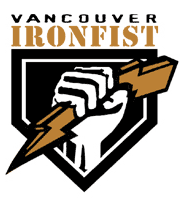
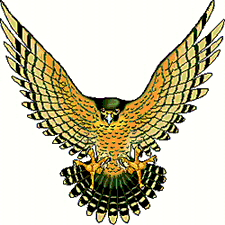 Yankees and Red Sox... Rangers and Devils... Jets and
Dolphins... George W. Bush and the Muslim World...
They've got nothing on the hated archrivalry between
the Arkansas Golden Falcons' Mike "Stump"
Matiash and the Vancouver Iron Fist's Yaro
Zajac! These two original owners have faced off in
four World Series -- each winning a pair -- and have
grappled in two other post-season series. In fact,
they've finished 1-2 in the Morris Division in every
season but one!
Yankees and Red Sox... Rangers and Devils... Jets and
Dolphins... George W. Bush and the Muslim World...
They've got nothing on the hated archrivalry between
the Arkansas Golden Falcons' Mike "Stump"
Matiash and the Vancouver Iron Fist's Yaro
Zajac! These two original owners have faced off in
four World Series -- each winning a pair -- and have
grappled in two other post-season series. In fact,
they've finished 1-2 in the Morris Division in every
season but one!
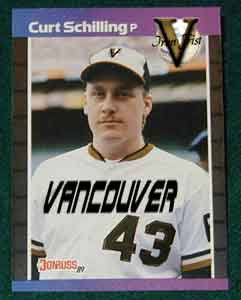 Without question, the centerpiece of the five-player,
four-pick deal was starting pitcher Curt
Schilling. Matiash had let it be known that the
ace was at the top of his Christmas list, and Zajac
confided in top-secret trade negotiations between the
two archrivals that he could be had -- for a price.
Without question, the centerpiece of the five-player,
four-pick deal was starting pitcher Curt
Schilling. Matiash had let it be known that the
ace was at the top of his Christmas list, and Zajac
confided in top-secret trade negotiations between the
two archrivals that he could be had -- for a price.
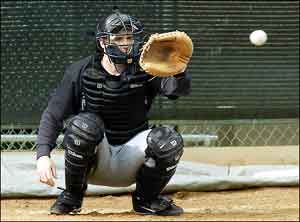 Along with Schilling, Arkansas got outfielder Kenny
Lofton and catcher Dan Wilson. Wilson, a
28-year-old minor-league veteran, had put up
impressive numbers in a half-season the year before
(.322, .519 SLG, 16 HR, 58 RBI), but he was strictly a
throw-in to replace Lopez on Arkansas's roster.
Along with Schilling, Arkansas got outfielder Kenny
Lofton and catcher Dan Wilson. Wilson, a
28-year-old minor-league veteran, had put up
impressive numbers in a half-season the year before
(.322, .519 SLG, 16 HR, 58 RBI), but he was strictly a
throw-in to replace Lopez on Arkansas's roster.
 "I guess we both won, because Schilling helped him win
a few championships and Lopez solidified my catching
position for several years, and I ended up trading him
to Harrison for pitching help," Zajac said.
"I guess we both won, because Schilling helped him win
a few championships and Lopez solidified my catching
position for several years, and I ended up trading him
to Harrison for pitching help," Zajac said.
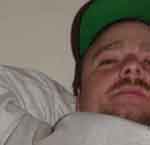 Despite it all, however, Zajac insists the trade came
out even for both teams.
Despite it all, however, Zajac insists the trade came
out even for both teams.